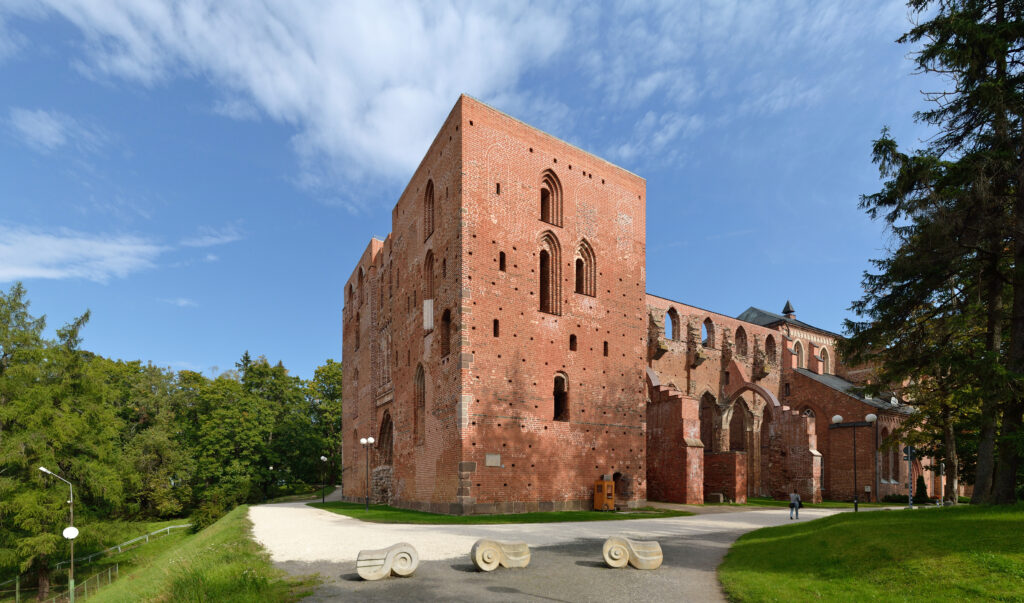By Mihkel Mäesalu and Stefan Pajung
Gerhard von Jork, the Master of the Livonian Branch of the Teutonic Order (1309–1322) wrote to the town of Reval (Estonian: Tallinn) about certain men who were plundering in the bishopric of Dorpat (Estonian: Tartu) and in Russian lands. He complained that these robbers base themselves in Danish Estonia, where they are free to sell their loot. Therefore, Gerhard asked Reval to send envoys to a meeting in Ermes (Latvian: Ērģeme) to discuss how these robbers could be exterminated and banished from the land. Sadly, Gerhard’s letter is only dated the 3rd of February, but not the year. But it must have been written between the years 1317 and 1322.
At first, we though that this letter of Gerhard’s as nothing more than a note in the ‘annals of crime’. It was only in September that we suddenly saw a possible connection between the events described in Gerhard’s letter and the story of John of Wesenberg, the cleric from Danish Estonia who was the subject of our blog a few month ago. Back then, we just thought that he was thwarted in his efforts in becoming provost of the cathedral chapter of Dorpat and then instead ended up in Denmark.
But it now appears that there was more behind the story. For we came upon some sources in which bishops Nicolaus (1311–1323) and Engelbert (1324-1341) of Dorpat accused John of Wesenberg of murder, pillage and countless other crimes. It is well known that John had been in a conflict with Bishop Nicolaus because Nicolaus had not accepted John’s papal provision to a canonry in Dorpat. It seems quite reasonable to see a connection between these accusations against John of Wesenberg and the robber’s mentioned by Gerhard von Jork. Could it be that John was engaged in a private feud against the bishop of Dorpat because of the bishop’s rejection of the papal provision? Did John persuade his friends and relatives among the royal vassals and warriors of Danish Estonia to attack the bishopric of Dorpat?

Photo by Ivar Leidus
Source: Wikimedia commons
At first, we thought that possible reasons why bishop Nicolaus of Dorpat went to Denmark to see the king were either another attempt to swap his own diocese with the bishopric of Schleswig, or to negotiate an alliance with the Danish king, which would give Nicolaus a bit more ease of mind in case the Russian princes moved against Dorpat.
But with this new information about John of Wesenberg in mind, we actually tend more and more towards that bishop Nicolaus travelled all the way to Denmark in 1319 and appeared at the royal court there in order to raise complaints about the king’s vassals and subjects in Estonia attacking and pillaging his bishopric – and demanded that the king intervened.
Unfortunately, he did not reach a solution with king Erik Menved before he died in November 1319. So, he stayed for the election of a new king, which happened to be the dead king’s brother. We do not exactly know how the immediate situation in Livonia was resolved, but in 1321 John of Wesenberg was appointed canon in Aarhus, specially selected for the newly established canonry. In Aarhus, he was praised as being an excellent scholar, yet being a man of the world – was that an euphemism for his earlier life and actions in Estonia?
But John of Wesenberg was not that easily persuaded to give up on his promised position in Dorpat. On the 22nd of October 1324, the pope – presumably, because John himself had applied for the job – even appointed John of Wesenberg provost of Dorpat cathedral, and gave him a canonry and a prebend there. This position had opened up, when the former provost Engelbert von Dolen was elected bishop. But the chapter at Dorpat was quite uneasy about this papal appointment of John of Wesenberg. Bishop Engelbert appealed the appointment to the curia and stated that John was not welcome, as his appointment – understandably – would be deeply resented by the canons in Dorpat and would – even more understandably – cause all kinds of trouble.
After some time, Engelbert and the Dorpat chapter must have won their case at the curia, thereby barring John of Wesenberg from the office of provost in Dorpat, as the pope in December 1328 wrote to the bishop and the provost of Ösel (Estonian: Saaremaa) and to magister Jacob of Mutina, a canon of Cambrai. He authorized them to give bishop Engelbert the authority to appoint a suitable person as the new provost of the cathedral chapter of Dorpat.
John of Wesenberg had to be satisfied his with the canonry in Aarhus instead. Eventually, he was also appointed schoolmaster at the cathedral school of the bishopric of Ösel.


